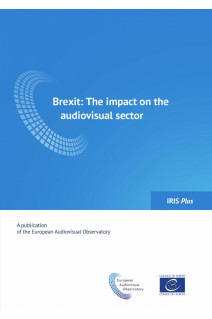



Executive summary
1. Brexit in context : the UK in the EU audiovisual market
1.1. Weight of the UK in the European Union’s audiovisual market
1.1.1. Audiovisual market
1.1.2. Content production
1.1.3. Audiovisual media service
1.2. Film and TV fiction co-productions and exports
1.2.1. Co-productions
1.2.2. Exports and imports
1.3. Overview of the workforce in the audiovisual sector
1.4. Main EU funding streams
1.4.1. MEDIA Sub-programme
1.4.2. Cohesion policy
1.4.3. Horizon 2020
1.4.4. Erasmus+
1.4.5. UK contingency strategy
1.5. State aid
2. European legal framework
2.1. The EU single market
2.2. Audiovisual media service
2.2.1. Introduction
2.2.2. Back to the ECTT ?
2.2.3. The importance of being European
2.3. Copyright
2.4. E-commerce and net neutrality
2.5. State aid
2.5.1. State aid for films and audiovisual works
2.5.2. State aid for public service broadcasting
2.6. Film and audiovisual co-production
3. Priority issues in the audiovisual sector
3.1. Relationship between EU and UK law after Brexit
3.2. Free movement of persons and access to a skilled EU workforce
3.3. Free movement of goods and services and access to audiovisual markets
3.3.1. Possible impact of Brexit on the “Country of Origin” principle
3.3.2. Possible impact of Brexit on trade in audiovisual goods and services
3.3.3. Possible impact of Brexit on quotas of European works
3.4. Ensuring access to EU funding streams after Brexit
3.4.1. Main aspects of UK access to EU funding
3.4.2. Future arrangements after Brexit
3.5. State aids and fiscal incentives after Brexit
3.6. Ensuring a supportive copyright and enforcement regime after Brexit
4. Main concerns raised by Brexit for audiovisual industry stakeholders
4.1. Keeping access to EU talents
4.2. Ensuring access to the EU market and beyond
4.2.1. Global support from the industry for the “Country of Origin” principle
4.2.2. Opening up new opportunities for trade
4.2.3. Keeping the status of “European works” for UK works after Brexit
4.3. Ensuring access to EU financing streams and co-production incentives
4.4. Ensuring high standards of copyright protection and enforcement
5. Enforcement and dispute resolution
5.1. The issues at stake
5.2. The House of Lords’ report
5.3. The UK proposal of July 2018
5.4. The Commission’s position
6. Waiting for an agreement
6.1. The UK’s “Policy Paper”
6.2. “Reciprocity gaps”
6.3. Opportunities in times of Brexit
6.4. The “no deal” scenario
6.4.1. Copyright rules
6.4.2. Audiovisual services

Please note that in accordance with our terms & conditions, PDF/epubs may only be purchased by private individuals.
